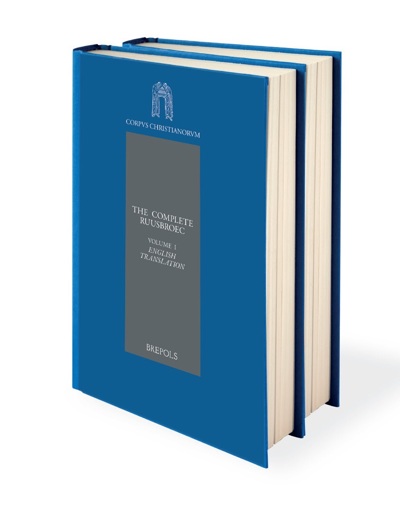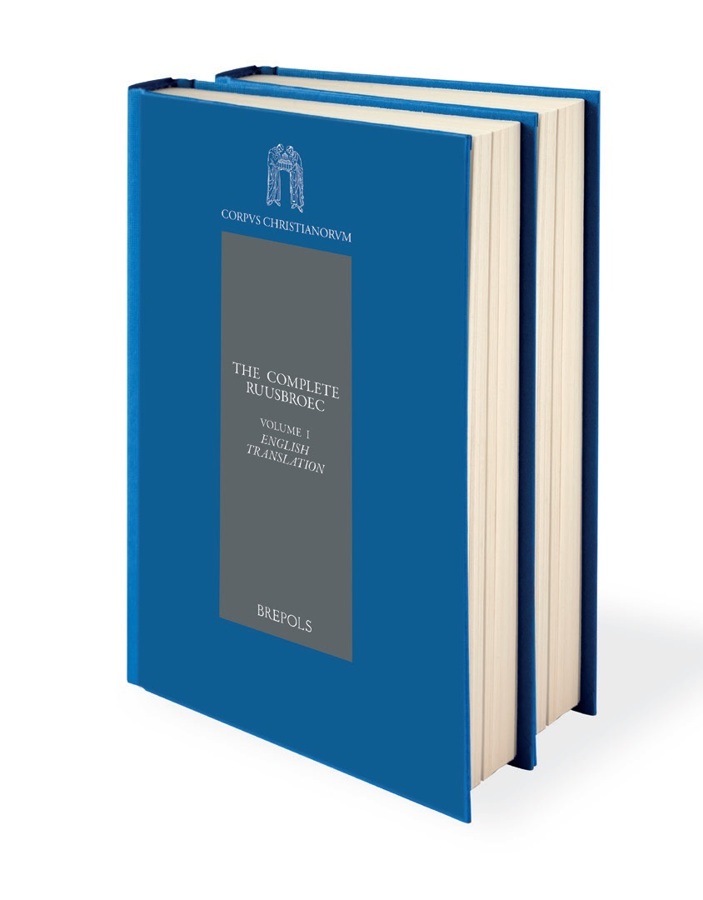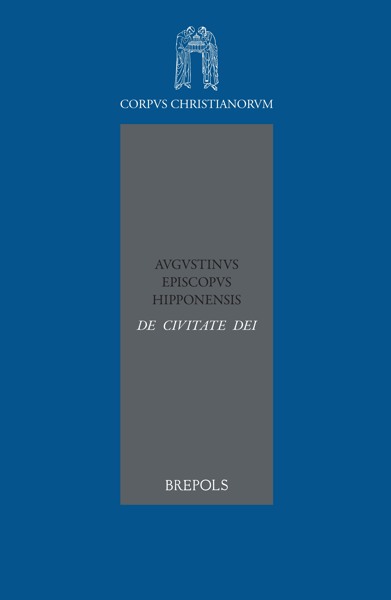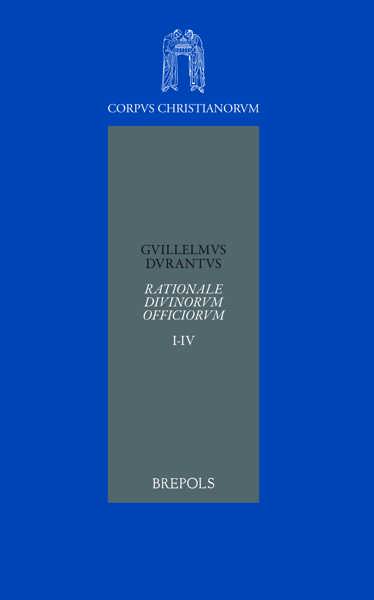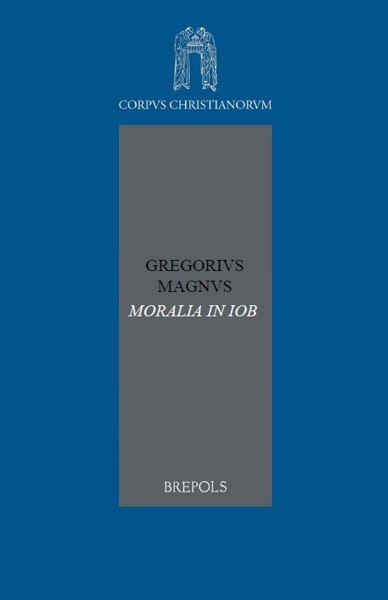
Jan van Ruusbroec
The Complete Ruusbroec
English Translation with the Original Middle Dutch Text
Guido de Baere, Thom Mertens (eds)
- Pages:2 vols, 1613 p.
- Size:156 x 234 mm
- Language(s):Middle Dutch, English
- Publication Year:2014
- € 110,00 EXCL. VAT RETAIL PRICE
- ISBN: 978-2-503-54954-5
- Hardback
- Available
"This highly attractive new edition will hopefully expose an entirely new readership to Ruusbroec's Opera omnia, and this is much to be welcomed. The editors derserve our utmost appreciation and deepest gratitude for undertaking this important task." (R. Van Nieuwenhove, in: Ons Geestelijk Erf, 86, 2015, p. 81)
“The Complete Ruusbroec is the Scholars’ Version of the complete works of Jan van Ruusbroec that were edited from 1981 until 2006 under the title Opera Omnia (Corpus Christianorum,Continuatio Mediaevalis 101–10). It includes the Middle Dutch originals (edited by Jos Alaerts, Guido de Baere, Rob Faesen, Mikel Kors, Thom Mertens, Hilde Noë, and Kees Schepers) and the English translations (by Helen Rolfson, André Lefevere, Phayre Crowley, and Kees Schepers) of the complete edition, but (unfortunately) leaves out the Latin translation by the Carthusian monk Laurentius Surius. Volumes of the Opera Omnia have been reviewed extensively, for example, by Claude Lecouteux in Études Germaniques (1989) and John van Engen in Speculum (1991). Without going into the details of the edition and translation, I would therefore like to judge this new version on its own merits, and explain what I deem the four cardinal features or ‘temptations’ of these two handsome volumes.
The first feature is the medieval author himself, Ruusbroec (d.1381), the wonderful medieval mystical writer whose importance for Western spiritual life and doctrine cannot be overstated: ‘Ruusbroec is one of the few medieval writers whose work has been read, translated, and commented upon throughout the ages until today. One of the most translated writers in Dutch literature, Ruusbroec brings the literature of the Low Countries onto the world stage’ (back cover). In a small introduction (20 pp.), the editors deal with his life, his teaching (on introversion, the Trinity, exemplarism, and the ‘common’ life as the fulfilment of mystical life), his mysticism, his humanism, and the dating and occasion of his works. This is a good measure of information for such an edition, whose readers will probably be acquainted with the original edition, as well as larger introductions to Ruusbroec such as A Companion to John of Ruusbroec, edited by John Arblaster and Rob Faesen (2014), Geert Warnar’s Ruusbroec: Literature and Mysticism in the Fourteenth Century (2011), and Paul Mommaers’ Jan van Ruusbroec. Mystical Union with God (2009).
The second feature is the Middle Dutch edition (in Volume II). It includes all works of Ruusbroec: Dat rijcke der ghelieven (The Realm of Lovers), Die geestelike brulocht (The Spiritual Espousals), Vanden blinkenden steen (The Sparkling Stone), Vanden vier becoringhen (The Four Temptations), Vanden kerstenen ghelove (The Christian Faith), Van den geesteliken tabernakel (The Spiritual Tabernacle), Vanden seven sloten (The Seven Enclosures), Een spiegel der eeuwigher salicheit (A Mirror of Eternal Blessedness), Van seven trappen in den graed der gheesteleker minnen (Seven Rungs in the Ladder of Spiritual Love), Boecsken der verclaringhe (Little Book of Explanation), Vanden XII beghinen (The Twelve Beguines), and Brieven (Letters). To read these works for the first time can be quite a revelation – if not a ‘transforming’ experience – for scholars who are searching for the structures and essences of Christian, mystical wisdom.
The third feature is the English translation (in Volume I). Preceding the translation is a fifty-page overview of the contents of the treatises and letters; following this is an apparatus of sources and parallel passages, bibliographical references, two appendices (on Variants in the translation and Corrections in the Middle Dutch text), and a bibliography. The translation in this version leaves out the line breaks of the Opera Omnia but retains the original line numbering. The English translation was corrected by the editors where necessary. The result is an up-to-date translation in a nice layout. To give just one example: ‘Maer boven alle werke ende ufeninghe van dooghden soe vertooent onse hemelsche vader sinen sunderlingen gheminden dat hi niet alleene en es ghieregh ende melde in eisschene ende in ghevene, maer hi is selve ghieregheit ende meldheit, want hi wilt ons hem selven gheven ende al dat hi es, ende hi wilt dat wi ons heme weder gheven met al dat wi sijn’ (Vol. II, pp. 571–72) becomes ‘But above all works and practice of virtue, our heavenly Father shows to His particularly beloved ones that He not only is avaricious and generous in demanding and in giving, but that He is avarice and generosity itself, for He wants to give us Himself and everything that He is, and He wants us to give ourselves to Him in return with everything that we are’ (Vol. I, p. 616). The result is thus an equally handsome text that loses nothing of the theological paradox that is so characteristic of Ruusbroec’s message and the ‘total’ spirituality so evident in his Middle Dutch, namely, that God gives and takes everything, while our works and willingness compliment His grace.
The fourth feature is the price: €98 (currently €110) or $177 (at Walmart); a very small ‘gift’ for a wealth of spiritual wisdom, offered by one of the greatest mystics of all time and contained in this sparkling gem among scholarly editions.” (Krijn Pansters, in: The Medieval Low Countries 2, 2015, p. 257-258)
Reviews of the complete text of all of Ruusbroec's works as published in Corpus Christianorum, Continuatio Mediaevalis volumes 101 to 110:
«Tutto ciò dimostra come l’intenzione degli editori di restituire al pubblico il testo ruusbroechiano in quanto possibile nella sua integrità, sia riuscita.» (G. della Croce, in: Carmelus 29, 1982, p. 167)
"The new edition will make known to many what is already known to some: Ruusbroec is one of the greatest medieval theologians of any kind." (K. Emery, Jr., in: Speculum, 1985, p. 195)
« Comme tous les volumes de cette précieuse collection Die geestelike Brulocht propose un texte à l’abri des reproches et des commentaires pouvant servir de point de départ à des recherches ultérieures. Il serait bien que les bibliothèques françaises le possédassent. » (C. Lecouteux, in: Études Germaniques 4, 1989, p. 443)
"Mit dieser sehr gründlichen und hilfreichen Edition werden die Werke des Mystikers Ruusbroec einem breiteren Publikum zugänglich gemacht. Sie liefert eine Grundlage für vielfältige Forschungsinteresssen." (E. Gröthe, in: Bulletin codicologique, 1990)
"For scholars of Ruusbroec’s thought and works, this is quite simply the edition to use." (John van Engen, in: Speculum, October 1991, p. 947)
"Die Edition ist zweifellos eine Bereicherung für jeden an mittelniederländischer Mystik Interessierten." (G.S., in: Deutsches Archiv für Erforschung des Mittelalters 47, 1991, p. 651)
"These meticulously presented texts and translations will make Ruusbroec better known and understood for English-speaking as well as for Dutch readers." (J. P. H. Clark, in: Downside Review 110, 1992, p. 155)
« Cet ouvrage est [...] un monument. L’édition des textes est soignée, fiable. » (C. Lecouteux, in: Études germaniques, janvier-mars 1992, p. 75)
"Het werd opnieuw een wetenschappelijke zwaargewicht, vrucht van gedegen onderzoek en taalstudie, verzorgd tot in de kleinste details." (J. Bonny, in: Collationes 22, 1992, p. 207)
"Los estudios de la espiritualidad disponen de un instrumento de trabajo insustituible para el conocimiento de la doctrina del Admirable." (F.A., in: Revista de Espiritualidad, s.a.)
"Uit het bovenstaande mag blijken dat we hier te maken hebben met een eerlijke en degelijke uitgave waarvan het belang voor het onderzoek van de mystiek van de Zuidelijke Nederlanden in het algemeen en van Ruusbroec in het bijzonder niet onderschat kan worden." (M. De Reu, in: Trajecta 1, 1992, p. 94)
«Si tratta di un’opera magistrale» (A. Strusi, dans: Scriptorium. Bulletin Codicologique 2, 2015)
Ruusbroec is one of the few medieval writers whose work has been read, translated, and commented upon throughout the ages until today. One of the most translated writers in Dutch literature, Ruusbroec brings the literature of the Low Countries onto the world stage.
Ruusbroec's genius is paradoxical. His stylistic devices are simple, but his wording flawless. He describes concrete details of daily life, but also seeks to evoke how the everyday participates in spiritual love and the Holy Trinity. He loves the Church, but his criticism of its corruption anticipates Savonarola. He praises secluded life, but also emphasises the universality of such life whereby the true contemplative is a 'common' person.
This set of two volumes includes the complete text of all of Ruusbroec's works - the original Middle Dutch version as well as a new English translation - as published in Corpus Christianorum, Continuatio Mediaevalis, volumes 101 to 110. The edition is preceded by a short Introduction describing Ruusbroec's life and doctrine and summarising the dating and context of the various treatises and letters, and is followed by a source apparatus.
